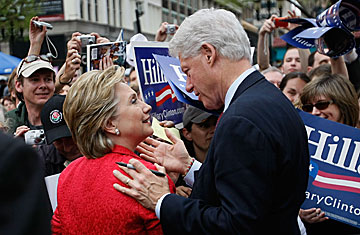
Bill and Hillary Clinton campaign in April.
There was a lot of back-and-forth this week after TIME's Karen Tumulty and Mike Weisskopf reported that Bill Clinton was quietly maneuvering behind the scenes to secure a place for his wife on the Democratic ticket. Sure, he was interested, but what about her? My experience from covering Bill and Hillary tells me that when one Clinton gets something in his or her head, the other usually isn't very far behind. But whether or not you think that rule applies in this case, the whole thing did not leave me wondering whether the Clintons were now eyeing the Naval Observatory, where vice presidents live in Washington. Instead, I wondered about the wisdom of the way they had started down this Veepstakes road.
Let's say you were an also-ran with 1,750-plus delegates on Memorial Day weekend, fated to come in second, but intrigued by the second spot. You would feel entirely justified in making the ask. But more than anything else, you'd face a choice: do you make a big push now, argue that you deserve consideration, make the appeal right at the start — the way Jesse Jackson did it to Michael Dukakis after the last primary in 1988?
Or do you go a different route, take a deep breath, lay low for a while, watch your rivals pick up barnacles and make mistakes, take the silent, high road and then emerge as the last person standing? Why isn't that approach smarter? After all, there is no huge rush. The campaign is exhausting, feelings get bruised, and it makes sense to give everyone involved in this race, both winners and losers, a little timeout before we ask them to make any really important decisions, like, say, choosing a vice president. So why not just wait on that conversation? In 2004, John Kerry was in no hurry to make the decision — and didn't like the way some candidates pressed their case. What does a force-your-way-on-to-the-ticket approach get you?
* * *
It's worth recalling that the Clintons tried something similar — though far more muted — about this time four years ago. People who claimed to be operating on behalf of a then-first-term Senator Clinton sent quiet feelers to the John Kerry camp in the summer of 2004, hinting that she should, at least, be considered for the number two spot. How strong was this suggestion? One person who watched it unfold likened it to a "whisper" that never amounted to "pressure," but was an unmistakable pass nonetheless.
There is no doubt, at least, that Kerry gave Clinton a look. Bob Shrum, Kerry's all-around strategist in that cycle, wrote about a brief consideration of Clinton in his book but said later that the Kerry team discarded the idea because her negatives were too high to bear.
Did the too-gentle 2004 approach teach the Clintons to be more aggressive? Maybe. That year, someone else, namely John Edwards, was chosen (and, once more, he is not that far from center stage this campaign season.) Anyway, given what happened before, and given the stakes this time, all that made me wonder if the Clintons decided to try a different strategy this time around. If they intend to succeed, I'm betting the Clintons will soon dial back their push and take the quieter, high road approach — if they haven't already.
* * *
Amid all this shadowboxing, mind-reading and recalibrating, how can Clinton and Obama possibly work out their differences? All of our reporting suggests that it's already begun.
Of course, as both sides insist, no talks, no contacts, no negotiations have occurred. But it's plain to see that they are listening to each other now. On Tuesday, Hillary's seconds made it as clear as anyone possibly could that they did not appreciate the way Obama was planning to repair to Des Moines on Tuesday night and declare mathematical victory. A premature end zone dance, they added, was just the wrong way to court female voters who had backed Clinton and were reluctant to transfer their loyalties.
Anyway, the message was sent loud and clear throughout that day and certainly looked like it had been received by the time Tuesday night came around. The resulting Iowa rally had a more muted feel than many expected, suggesting at the very least that Team Obama heard the complaint — or have bought the female-voter-threat idea enough not to take chances. As TIME noted this week, some of the phrases Obama used that night were notably similar to suggestions made by of Clinton backers who were trying to repair the breach.
After months of talking past one another, Chicago and Arlington now have at least erected a rudimentary — but effective — communications link.
